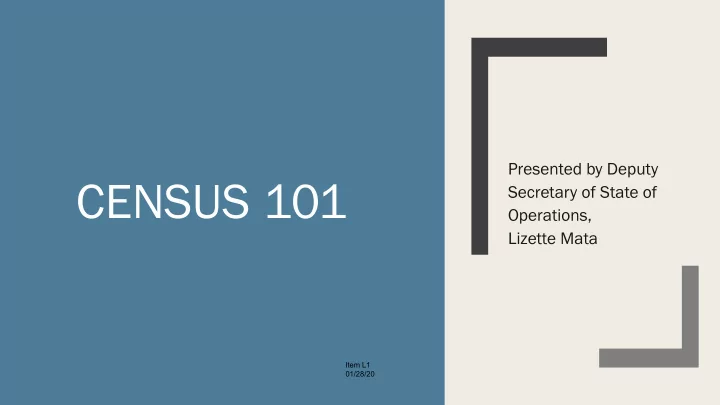

Presented by Deputy CENSUS 101 Secretary of State of Operations, Lizette Mata Item L1 01/28/20
What is the Census? ■ The U.S. Constitution requires an accurate count of every person living in the United States every 10 years. The next census is in 2020 and asks questions that provide a snapshot of the nation and will determine how more than $675 bi $675 billion i in n fed eder eral f fund unding is distributed to states and communities each year. ■ Census results affect your voice in government, how much funding your community receives, and how your community plans for the future. ■ For every Californian missed during the Census 2020 count, the State is expected to lose approximately $1,000 per person, per year, for 10 years, in federal program funding. ■ California leaders have invested a total of $187 million to ensure an accurate count.
Why is the 2020 Census important?
Cal alif ifornia nia Complete C Count unt- Stat ate e Cens ensus us O Office Divided the state into 10 10 regions and assigned a state Census staffer to each region to collaborate and coordinate with unique hard-to-count communities there. This regional management structure is core to the outreach team’s ability to establish and coordinate local relationships and effectively manage contracts. ■ Held 24 Statewide Readiness Assessment Regional Convenings (2018) that brought together community-based organizations, advocacy groups, local governments and others. ■ Launched the California Complete Count Committee, which meets quarterly to advise and inform state Census staff. ■ Updated the state Legislature and Governor’s Office with quarterly reports documenting progress of the state’s campaign. ■ Coordinated three tribal government consultations in Northern, Central and Southern California. Native American and Tribal populations have historically been difficult to count in the Census. ■ Conducted county kick-off orientations to brief the counties on their contractual obligations and facilitate any questions.
California 2020 Census Regions
California Complete Count Committee (CCCC) members
What is the Secretary of State’s Office doing for census outreach? ■ Digital/Online: – Creating fact sheets for the top 25 hardest to count counties, which is posted on our website and social media platforms. – Creating an easily accessible Census webpage on the Secretary of State’s website, which includes helpful resources and a video PSA from the Secretary – Disseminating information regarding the census to all SOS employees via our digital newsletter and reminders via agency emails ■ Physical Locations and Spaces: – Promoting the census in high traffic locations of the agency, including the main lobby and the California Museum. – Many community-based organizations have created content which you can display. If you would like help in connecting to a specific organization or would like to know who represents a particular area, the California Census team and the Secretary of State’s office can assist.
What is the Secretary of State’s Office doing for census outreach? (cont.) ■ Services and Programs – Including census information and the Census Bill of Rights in the voter information guide, which is sent to over 13 million voters – California State Archives will be publishing an online Google exhibit on the census ■ Outreach and Events – Promoting the census during all speaking commitments the Secretary attends – Attending California Complete Count Committee Hearings throughout the state – Attending Census outreach events hosted by community organizations throughout the state when scheduling permits – Creating outreach materials for college students and high schoolers, targeting a family’s trusted messenger via longstanding partnerships.
Who can I contact for more information?
How can I help? ■ There are 3 easy ways you can help make sure your community completes the census and receives funding for important services. – Fill out the census form online or on paper. – Ensure your family, friends, and coworkers fill out the census. – Educate your community about the census and why it is important to complete the census.
Recommend
More recommend